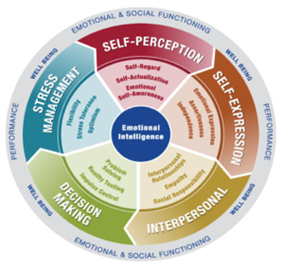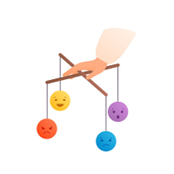IQ (Intellectual Quotient) is the measure of cognitive abilities such as verbal understanding, reasoning, working memory, and processing speed. It is often used as a gauge of general intelligence and is influenced by both genetic and environmental factors.
EQ (Emotional Quotient) measures emotional and social skills, such as the ability to perceive and express emotions, develop and maintain social relationships, handle difficult situations, and effectively use emotional information. EQ should not be confused with personality or ability; it measures how we use our emotions.

Studies indicate that IQ development generally stabilizes by age 18, while EQ continues to develop throughout life. Both IQ and EQ can greatly contribute to personal and professional success, and it is important to note that good communication and emotional intelligence (EQ) are as important, if not more so, than intelligence (IQ). A high IQ alone does not guarantee success if one cannot clearly and effectively communicate their ideas. Likewise, a lack of emotional intelligence can make it difficult to build relationships and secure the support needed to implement ideas.
In Project Management, human factors often play a significant role in the success or failure of a project. The Project Management Institute reports that the main causes of project failure are poor communication (42%), lack of leadership (29%), poor planning and follow-up (28%), and inadequate risk management (19%). Similarly, The Standish Group’s 2020 « CHAOS Report » and Deloitte’s 2020 « Global Project Management Survey » both highlight poor communication and collaboration as key factors in project failure.
EQ also has a significant impact on Leadership quality. Leaders with high EQ are better able to understand and manage their team’s emotional reactions, communicate, and solve problems more effectively, handle ambiguity, and inspire their teams to achieve common goals.
Just as there are tools to measure IQ, there are also tools to measure EQ. One such tool is EQ-i 2.0. It approaches Emotional Intelligence through 15 skills, such as optimism, empathy, tolerance to stress, grouped into 5 dimensions:
- Self-perception: Inner strength, self-confidence, alignment of values, understanding of emotions, and their impact on thoughts and actions.
- Self-expression: Independent action, the ability to express ideas and opinions in a constructive manner.
- Human Relations: Building and maintaining relationships based on trust and compassion, articulating different perspectives, and responsible behaviours.
- Decision making: Understanding the impact of emotions on decision-making, impulse control, and objectivity.
- Stress management: Managing emotions in changing situations, resilience following frustration, and handling unforeseen events.

The tool helps to turn intangible elements of perception and impressions into concrete data that can be analysed and worked with if necessary. The tool is even most useful when looking at the links between skills and highlighting imbalances between some of them. For example, a person with high assertiveness but low human relationship skills will tend to assert themselves without considering their impact on others. On the other hand, someone with low self-esteem but high competence in human relationships will tend to fade away and put others before themselves. When these two skills are balanced, the person can build and maintain good relationships while affirming their beliefs. You can also repeat the exercise with other skills such as optimism and a sense of reality.
 The EQ-i 2.0 tool can be used in multiple domains using a single questionnaire:
The EQ-i 2.0 tool can be used in multiple domains using a single questionnaire:
- Individual Assessment: Assessment of an individual’s emotional skills.
- 360°: Assessment of an individual’s abilities compared to how they are perceived by their manager, direct subordinates, colleagues, and possibly family and friends. It’s important to note that the reports are prepared to ensure confidentiality (the result only relates to gap analysis) and none of the individual reports are shared with participants.
- Group: Assessment of emotional intelligence at a team or group level. Confidentiality is ensured as results show only the group average.
- Leadership: Assessment of four key dimensions of leadership: authenticity, coaching, vision/perspective, and innovation.
Would you like to know more or are you interested in exploring your emotional intelligence?
We organize awareness workshops within and between companies. Through various activities, we help teams become aware of the impact of their emotions on themselves, their environment, their decision-making, and stress management. Our next inter-company workshop will be in March. Contact us at info@be.more-experience.com for details.
We are certified EQ-i 2.0 (Level 1 and 2) and provide Individual, 360°, Group and Leadership assessments. Please direct requests to info@be.more-experience.com.

